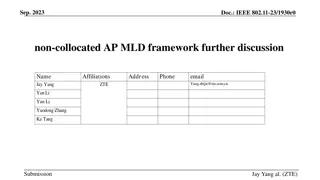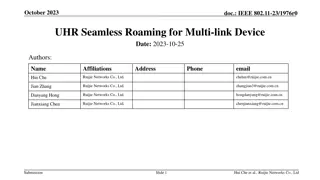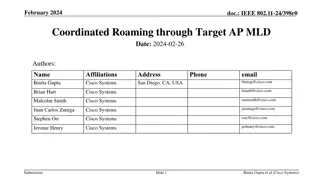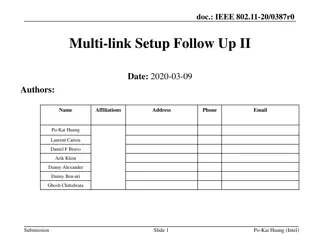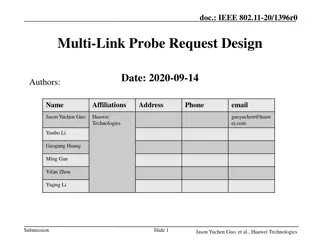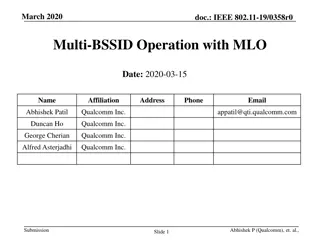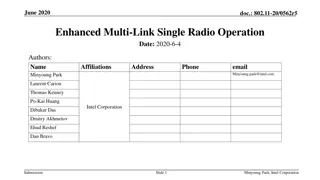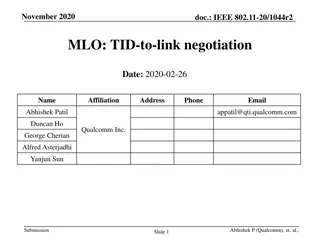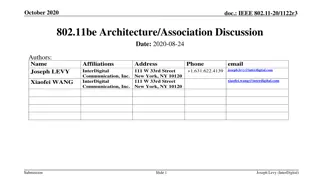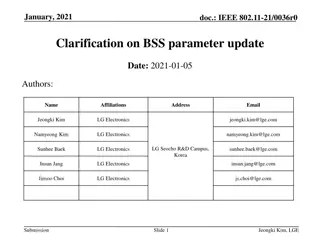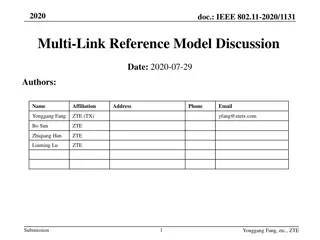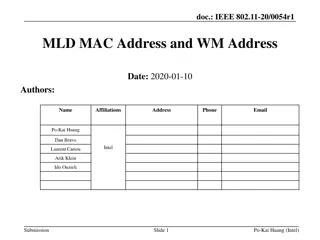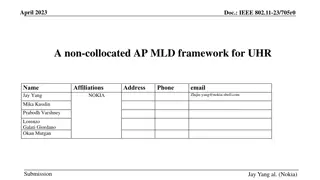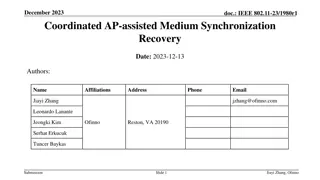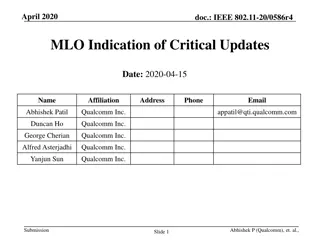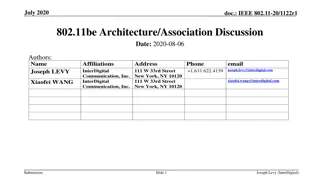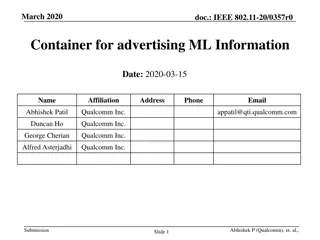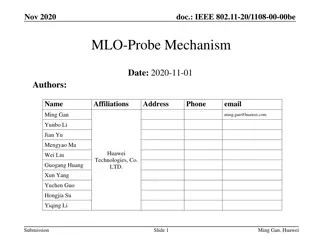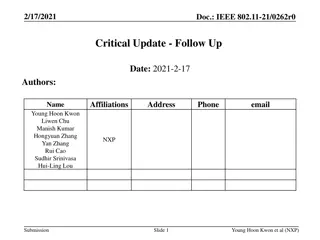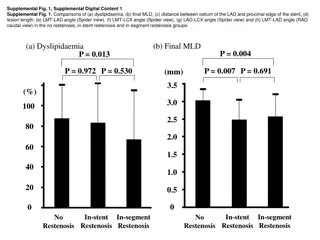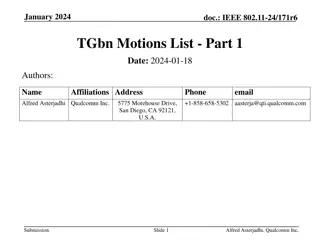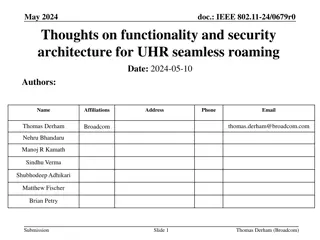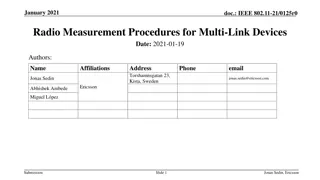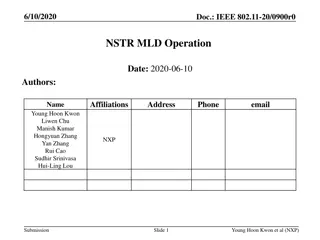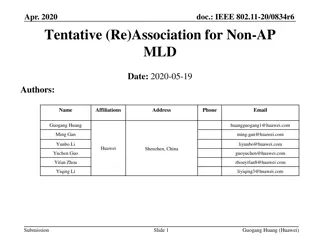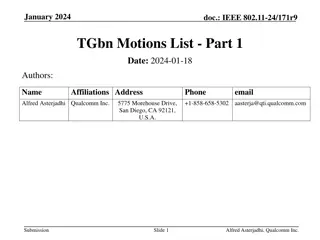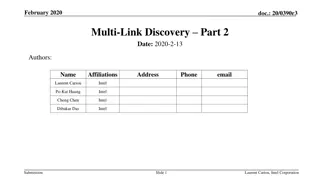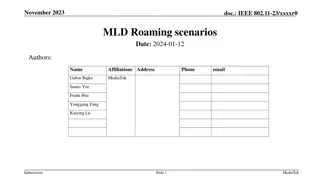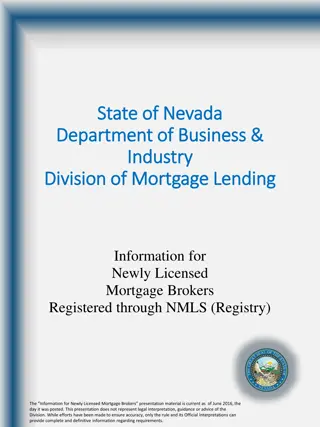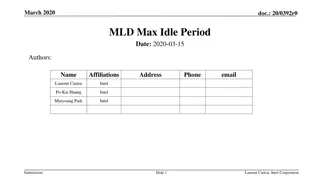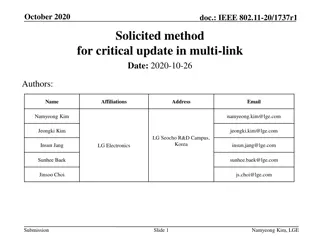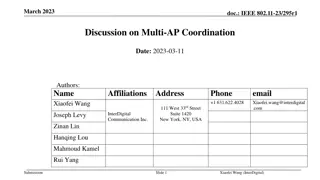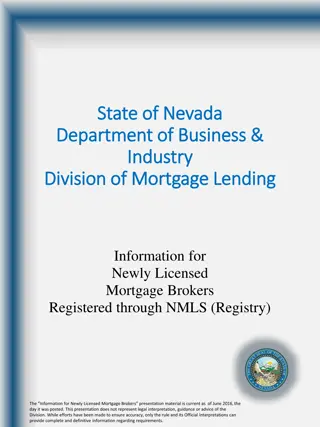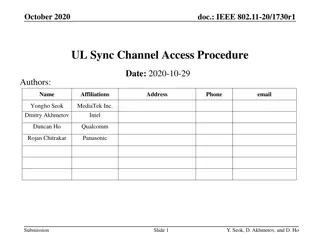Future of FTTR Products: Non-Collocated AP MLD Framework
In September 2023, IEEE 802.11-23/1930r0 discussed the use of non-collocated AP MLD framework in FTTR products for improved user experience. The framework aims to enhance Wi-Fi communication, seamless roaming, and Wi-Fi sensing integration. It simplifies AP MLD design, supports multiple links for in
6 views • 18 slides
Seamless Roaming for Multi-link Device in IEEE 802.11-23
Seamless Roaming scheme for non-collocated AP MLD in IEEE 802.11-23 aims to enhance roaming efficiency by utilizing multi-link operation. It addresses issues of data interruption and time wastage during traditional roaming processes. The mechanism involves sharing PTKs among non-AP STAs and storing
1 views • 14 slides
Coordinated Roaming Proposal for IEEE 802.11 Networks
This document presents a proposal for coordinated roaming through target AP MLD in IEEE 802.11 networks to address connectivity disruptions due to sudden RSSI drops or STA transition scenarios. The solution aims to ensure data continuity, preserve context, and minimize data loss during roaming hando
0 views • 11 slides
Progress on IEEE 802.11 Multi-link Setup
Significant developments have been made in the multi-link setup within the IEEE 802.11 framework. The focus is on allowing only one STA in the MLD framework, differentiation with STA-level associations, and the rationale behind restricting to one STA. Proposals for defining multi-link devices and re
0 views • 12 slides
Design Considerations for Multi-Link Probe Requests in IEEE 802.11-20
This document discusses the design considerations for multi-link probe requests in the IEEE 802.11-20 standard. It covers passive and active scanning methods, MLD-based versus link-based approaches, and probing for multiple BSSIDs. The focus is on enhancing efficiency and reducing frame bloating in
0 views • 16 slides
Multi-BSSID Operation with MLO Overview and Signaling Considerations
The document discusses the integration of Multiple BSSID set feature and Multi-Link Operation (MLO) in IEEE 802.11 networks. It delves into the setup of virtual Access Points (APs) on the same device with distinct attributes, the formation of common parameters across APs within an MLD, and the signa
1 views • 13 slides
Enhanced Multi-Link Single Radio Operation Proposal
The proposal discusses an enhanced mode of operation for single radio non-AP MLDs to enable multi-link operation, improving throughput and reducing latency. It addresses challenges in busy network environments, aiming to achieve low latency benefits similar to concurrent dual radio setups. The propo
0 views • 22 slides
IEEE 802.11-20/1044r2 TID-to-Link Negotiation Proposal
Proposal for a simple mechanism to negotiate TID-to-Link mapping between an Access Point MLD and a non-AP MLD to aid in traffic separation, latency-sensitive flow management, and overall channel access optimization. The negotiation process involves consideration of traffic profiles, load balancing,
1 views • 6 slides
Discussion on IEEE 802.11be MLD Architecture Alignment
IEEE 802.11 TGbe is exploring MLDs within the 802 architecture, focusing on aligning MLD operations with existing 802.11 features for enhanced compatibility. The MLD architecture aims to facilitate the flow of data between MAC SAPs and PHY SAPs, extending the current framework for APs and non-AP STA
1 views • 23 slides
IEEE 802.11-21/0036r0 BSS Parameter Update Clarification
This document delves into the IEEE 802.11-21/0036r0 standard, specifically focusing on the BSS parameter update procedure within TGbe D0.2. It details how an AP within an AP MLD transmits Change Sequence fields, Critical Update Flags, and other essential elements in Beacon and Probe Response frames.
1 views • 11 slides
IEEE 802.11-2020 Multi-Link Reference Model Discussion
This contribution discusses the reference model to support multi-link operation in IEEE 802.11be and proposes architecture reference models to support multi-link devices. It covers aspects such as baseline architecture reference models, logical entities in different layers, Multi-Link Device (MLD) f
1 views • 19 slides
IEEE 802.11-20/0054r1 MLD MAC Address and WM Address
In the document IEEE 802.11-20/0054r1, the focus is on Multi-Link Framework for MLD address identification and differentiation. It explains the usage of MLD MAC address and STA WM medium address in wireless setups. The document also addresses the need for identifying different MLDs using MAC address
0 views • 16 slides
Improving Latency Performance for Mobile Clients Using Non-Collocated AP MLD Framework
The UHR group aims to enhance latency performance for mobile clients by introducing a non-collocated AP MLD framework. This framework allows seamless transfer of client context between physical APs, improving roaming efficiency and supporting high numbers of links for non-AP MLDs. The proposed solut
3 views • 11 slides
IEEE 802.11-23/1980r1 Coordinated AP-assisted Medium Synchronization Recovery
This document from December 2023 discusses medium synchronization recovery leveraging multi-AP coordination for multi-link devices. It covers features such as Multi-link device (MLD), Multi-link operation (MLO), and Ultra High Reliability (UHR) capability defined in P802.11bn for improvements in rat
0 views • 8 slides
IEEE 802.11-20/0586r4 MLO Indication of Critical Updates
The document discusses the need for a mechanism in the MLO framework to enable non-AP MLDs to receive updates to operational parameters without monitoring all links. It proposes that each AP of an MLD should provide an indication of updates to another AP's operational parameters. It also outlines ho
0 views • 17 slides
IEEE 802.11be MLD Architecture Discussion
The document discusses the architecture of MLD (Multicast and Local Delivery) within the IEEE 802.11be framework. It highlights how MLD will align with existing 802.11 basic architecture, emphasizing the management of access to PHY and media for both AP and non-AP devices. The goal is to integrate M
0 views • 9 slides
IEEE 802.11be MLD Architecture Discussion
This presentation delves into architecture concepts for TGbe MLDs, focusing on AP and non-AP scenarios. It builds upon ideas from previous sessions, exploring topics such as RX/TX MSDU rate limiting, A-MSDU aggregation, packet integrity, and encryption. Implementation choices and legacy operation co
0 views • 15 slides
Framework for Advertising Multiple-Link Operations in IEEE 802.11
Proposed framework for advertising Multiple-Link Operations (MLO) capabilities in IEEE 802.11 networks classified into three categories: Common MLD Information, Per-Link Information, and Multiple BSSID features. Introduces a new element, Multiple Link Attribute (MLA) element, with profiles for each
0 views • 27 slides
IEEE 802.11-20/1108-00-00be MLO Probe Mechanism in AP MLD
This document discusses the design and implementation of a mechanism for a non-AP STA to send a probe request frame to an AP within an AP MLD, allowing the STA to request a probe response containing information on all APs affiliated with the same MLD as the target AP. It proposes the use of new elem
1 views • 12 slides
IEEE 802.11-22/0349r1 Feb. 2022 Discussion of NSTR and EMLSR
Discussion on the introduction of eMLSR in IEEE 802.11-22/0349r1 compared to other modes like NSTR, with a proposal to make eMLSR support mandatory on AP MLD side due to its significant gains and importance in MLO. The presentation also highlights the performance comparison between NSTR and EMLSR, a
2 views • 12 slides
IEEE 802.11-21/0262r0 Critical Updates Discussion Summary
The document discusses critical updates related to IEEE 802.11-21/0262r0, focusing on changes in system information for APs within an AP MLD. It addresses scenarios where non-AP STAs receive Beacon frames with direct inclusion events, potential issues with updating critical information, and proposes
0 views • 9 slides
Comparisons of Dyslipidaemia and Lesion Characteristics in Restenosis Groups
This supplemental content presents comparisons of dyslipidaemia, final minimal luminal diameter (MLD), distance between ostium of the LAD and proximal edge of the stent, lesion length, and various angle measurements in different restenosis groups. The findings highlight significant differences in dy
0 views • 4 slides
IEEE 802.11-24/171r6 TGbn Motions List - January 2024
The January 2024 document highlights motions discussed and approved in IEEE 802.11 TGbn Task Group meeting. The motions include enhancements for Ultra High Reliability WLAN, additions to TGbn SFD for distributed-tone RU in TB PPDU transmission, and defining mechanisms for AP MLD roaming. The documen
0 views • 14 slides
UHR Seamless Roaming: Functionality and Security Architecture Proposal
Discussion on the technical requirements for UHR seamless roaming, focusing on the non-AP MLD state preservation and data exchange context between AP MLDs. Proposing a security architecture based on FT to achieve seamless roaming while cautioning against sharing PTK(SA) across multiple AP MLDs. Emph
0 views • 34 slides
IEEE 802.11-21/0125r0 Radio Measurement Procedures for Multi-Link Devices
The IEEE 802.11 WLAN standard introduces the concept of Multi-Link Devices (MLD) in the 802.11be (EHT) amendment, enabling multiple affiliated STAs to work together. This document focuses on enhancing radio measurement procedures for MLDs to boost efficiency and flexibility in managing radio resourc
0 views • 14 slides
Enhancing Network Performance with NSTR MLD and SR/eSR MLDs
This document discusses the performance characteristics of Multi-Radio MLD (NSTR MLD) and Single-Radio/Enhanced Single-Radio MLDs (SR/eSR MLDs) in various operation scenarios. It highlights the strengths and weaknesses of NSTR MLDs and proposes ways to improve their operation efficiency. Additionall
0 views • 16 slides
IEEE 802.11-20/0834r6: Make Before Break Scheme Implementation
This document discusses the Make Before Break scheme to minimize data delivery interruptions during roaming for a single-radio STA. It addresses the challenges of interrupted data delivery during tentative association with a new AP on a different channel and proposes solutions to implement this sche
0 views • 21 slides
IEEE 802.11 TGbn Motions Summary - January 2024
The January 2024 document from IEEE 802.11 TGbn Task Group chaired by Alfred Asterjadhi includes motions discussing enhancements for Ultra High Reliability WLAN. Motion 1 in the PHY domain relates to a distributed-tone RU for TB PPDU transmission. Similarly, Motion 2 in the MAC domain discusses mech
0 views • 25 slides
Multi-Link Discovery in February 2020: AP Information Enhancement
The document discusses enhancing AP information in beacons/probe responses, proposing using Link ID to avoid duplicating information already present in the RNR. It explores carrying complete AP information within the same MLD using Neighbor reports and new elements.
0 views • 14 slides
IEEE 802.11-23 MLD Roaming Scenarios
This contribution focuses on discussing MLD roaming scenarios to enable seamless roaming for non-AP MLD STAs, aiming to reduce packet loss and latency during roaming through methods like make before break. Various aspects of Intra V-MLD Roaming architecture are explored, including optimizing data pa
0 views • 17 slides
Nevada Department of Business & Industry Division of Mortgage Lending Information
The Nevada Department of Business & Industry's Division of Mortgage Lending regulates mortgage-related activities in the state, aiming to foster professionalism and compliance while ensuring consumer protection. Mortgage brokers can find valuable resources, updates, and guidance on the MLD website,
0 views • 32 slides
Proposal to Simplify MLD Max Idle Period for Non-AP MLDs
Proposal presented in March 2020.doc suggests defining the MLD Max Idle Period at the MLD level instead of the STA level for non-AP MLDs. The objective is to indicate to APs through keep-alive frames that the non-AP MLD is still active without needing to tear down multi-link setups. The proposal off
0 views • 4 slides
Solicited Method for Critical Update in Multi-Link Environments
This document discusses a method for obtaining critical update information for Access Points (APs) within the same Multi-Link Domain (MLD) in IEEE 802.11 standards. It introduces the concept of Change Sequence fields in Beacon and Probe Response frames to indicate changes in system information for o
0 views • 18 slides
Discussion on Multi-AP Coordination Architecture in IEEE 802.11-23
In this document, Xiaofei Wang from InterDigital Communication Inc. discusses the architecture required for multi-AP operations, seamless roaming support, and general MLD operation support in the context of IEEE 802.11-23 standards. The focus is on coordinating various operations across multiple APs
0 views • 9 slides
Division of Mortgage Lending in the State of Nevada
The Division of Mortgage Lending in Nevada oversees mortgage brokers, bankers, agents, and servicers to ensure industry compliance and consumer protection. Their mission includes promoting professionalism, education, and ethics while fostering a competitive market. Mortgage brokers can find resource
0 views • 32 slides
UL Sync Channel Access Procedure in IEEE 802.11-20/1730r1
The document discusses the UL sync channel access procedure in IEEE 802.11, focusing on the conditions under which an STA affiliated with an MLD can initiate transmission, manage its backoff counter, and follow specific rules for accessing the channel. It proposes a straw poll to gather support for
0 views • 8 slides
